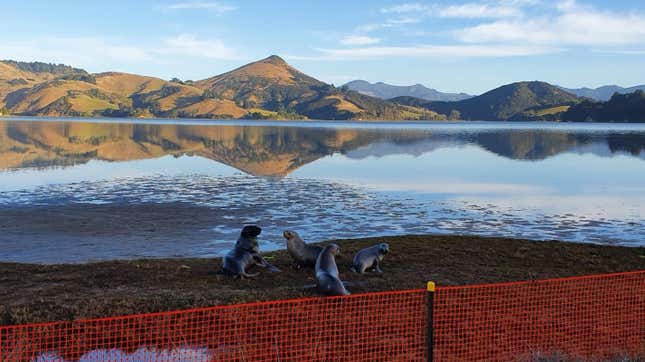
In New Zealand, a growing sea lion population is getting comfortable in unexpected places, including along hiking trails and in at least one public swimming pool. The comeback of this endangered species has meant more dangerous interactions between sea lions and humans, conservationists say.
An international team of researchers recently came together to overhaul distribution models for New Zealand sea lions, which are used to predict where the animals will go in an area, thus helping conservationists who are trying to protect them. The team produced an integrated model database that makes it easier to track where sea lions are likely to roam. Their paper is published this week in Methods in Ecology and Evolution.
The New Zealand sea lion (also called rāpoka) is one of the rarest sea lions in the world, with a total population of around 12,000. Once endemic across the country, the species was hunted off the mainland about two centuries ago. But in 1993, a single female sea lion (nicknamed “Mum”) had a pup on the south side of Otago. It was the first pup born on the mainland in a century, and now, the animals have finally established a breeding population there. Annual pup counts on the mainland are now about 15 per year, though the animals’ numbers are higher on the Auckland Islands and other islands in the area.
Humans are encountering these sea lions more often, including pups (which means a protective mother is likely nearby). According to a Michigan State University press release, hikers now stumble across the animals, which can rile up sea lion mothers and be a danger to both them and the humans. In January of this year, a mother sea lion gave birth near the 13th hole of a golf course, prompting local officials to close a nearby road.

“It’s one thing for wildlife rangers to look out for sea lions on sandy beaches, but it’s another challenge for them to tromp through forests to find baby sea lions hiding under the trees,” said Veronica Frans, an ecologist at Michigan State University and lead author of the new paper, in the university release. “While we can’t know for sure where female sea lions will go on the mainland, we can use models to make helpful predictions.”
According to a New Zealand Department of Conservation blog written by Frans, mother sea lions move their pups as far as 1.25 miles into inland forest for protection, a unique behavior among sea lion species. The move protects pups from the elements and from aggressive adult male sea lions, but the commute can be treacherous. Roads between the forest and the sea mean that the animals can become roadkill, and farmland fencing can obstruct their paths.

Frans’ team used several different models to offer a more nuanced prediction of female sea lion behavior, specifically regarding the animals’ breeding habitat requirements and the places that humankind has altered. The goal is to maximize the success of these creatures while minimizing their interactions with people. Some methods, like putting up protective fencing on certain beaches, go a long way in making sure the animals and humans don’t get mixed up.
“There is currently only one official breeding colony on the mainland right now, and only a few other spots where they’ve had pups, but the populations are still small,” Frans said in the release. “Nearly 400 sites seem like an incredible potential for a bright future for these sea lions. All signs point to many more sea lion pups in the future, if we do our best to welcome them.”
If all goes well, perhaps the pinnipeds can turn their newfound foothold on the New Zealand mainland into a full-blown residency.
More: Bat Sneaks Into New Zealand Bird of the Year Competition, Our Hearts